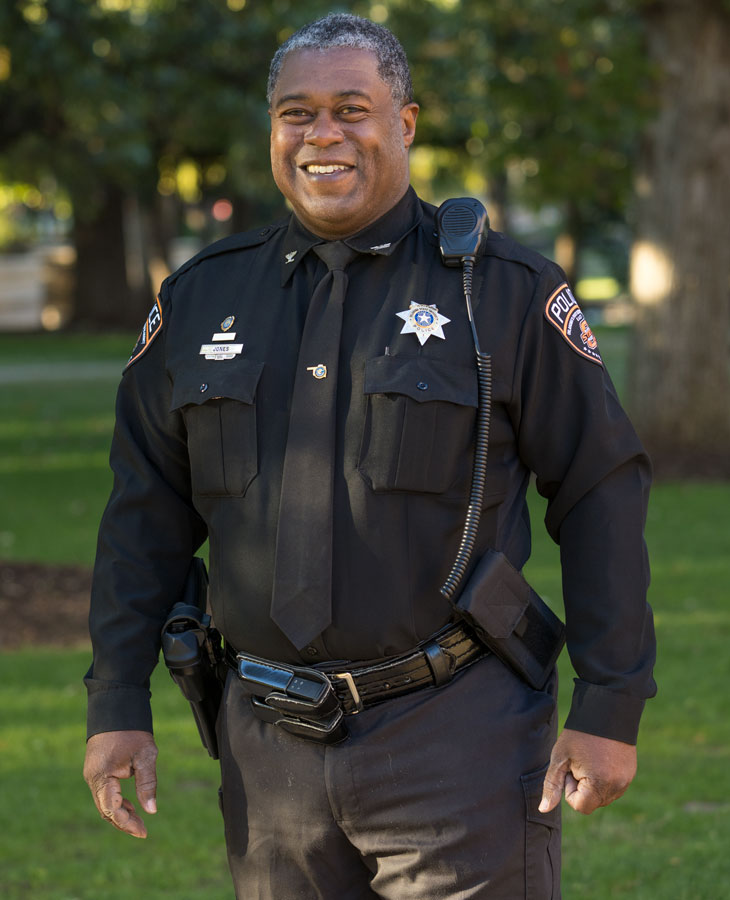
Chief's Choice: Jones takes roundabout way to becoming head of OSU Police Department
Thursday, December 21, 2023
Media Contact: Mack Burke | Associate Director of Media Relations | 405-744-5540 | editor@okstate.edu
When Leon Jones was growing up, he wanted to avoid two things at all costs: police and school.
Yet, for the last 29 years, he has been going through the same gray double doors on the north end of the U.S. Department of Agriculture building on the Oklahoma State University campus, first as an OSU police officer, then sergeant and since 2018 as the first Black chief of police.
“I never thought I was going to be a cop. I damn sure didn’t think I was going to finish a degree,” he said. “College just wasn’t in the plan.”
Jones has been a champion for building relationships between the police department and the university community. He’s become a model for the Cowboy Code, for doing what’s right, even when it’s hard and for finishing what he starts.
It’s been an interesting journey for the loner from little New Boston, Texas, a town of 4,600 near Texarkana.
Jones was recruited to play football for Kansas Wesleyan University with a partial scholarship. However, three weeks before orientation, he backed out. Football was one thing, but more school, especially two states away, was another.
Instead, on the day of his high school graduation when he was playing basketball with his friends, a guy drove into the park and yelled that he needed two people to lay carpet. Jones took the offer and spent the next year installing flooring.
As he was walking through Walmart one day, the store manager offered him a job. Jones left the hot, back-breaking work at the carpet company and worked his way from maintenance and stocking shelves to lawn and garden manager.
There, he stopped a woman trying to sneak out while concealing a boom box stuffed under her skirt. Not long after, he prevented a man from trying to steal a lawnmower. The district loss prevention officer happened to be in the store. Jones suddenly had a new career catching shoplifters.
A College Education
Life took Jones from New Boston to Enid, Oklahoma, and then from Enid to Stillwater, as he continued making a name for himself in loss prevention. One day, an officer who stopped Jones for speeding invited him to apply for the police department.
“He said, ‘Why don’t you join the OSU Police Department?’ When I went to pick up an application, I’ve still got my Jheri curls and my [Chicago] Bulls pullover,” Jones said. “It took me two weeks to bring [the application] back. I just didn’t know. We didn’t deal with the police when I was growing up. In fact, we didn’t want anything to do with them. When cops would pull over my dad and brothers, they were pretty mean to them. I wasn’t sure I wanted to do this, but then it’s like something would say, ‘Get in there. Take the opportunity. You might have an opportunity to change the minds of a lot of people. Maybe you have an opportunity to make a difference, not just by arresting people and writing citations, but changing people’s minds about the police.’”
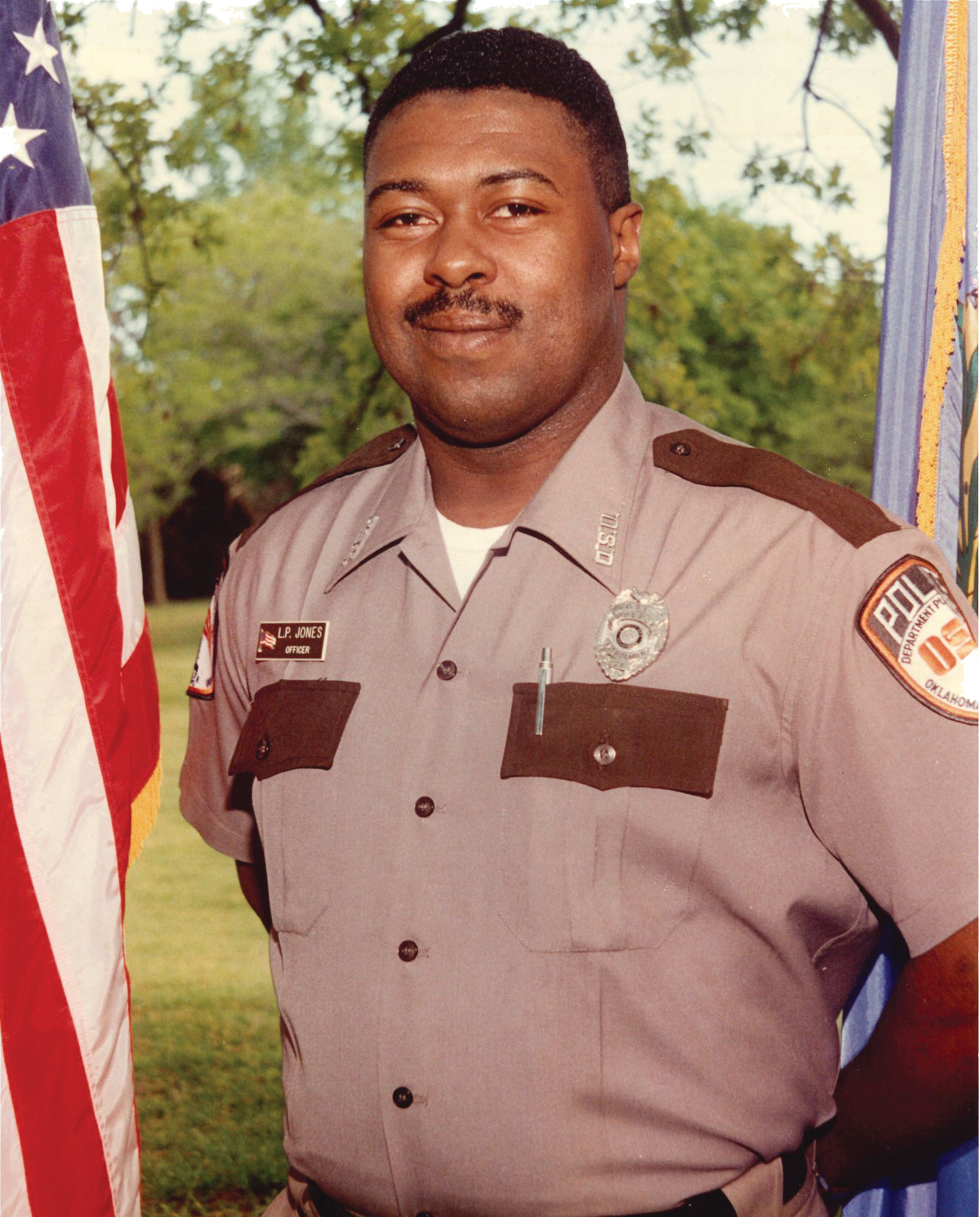
So, he applied, and in early October 1994, he was offered the position. The night before he went in to discuss the terms, he couldn’t sleep. What if he couldn’t do the job? After signing the papers, he still couldn’t sleep.
“I thought, ‘Man, I’ve got this job I have no clue about, and I’m scared I’m going to screw it up,’” he said.
When Jones was first offered the job, the chief asked his newest officer where he wanted to be in five years. Jones said he wanted to one day be sitting in the chief’s chair. The chief pointed to a college degree on the wall.
“You’re going to have to have one of those before you become the chief here,” he said.
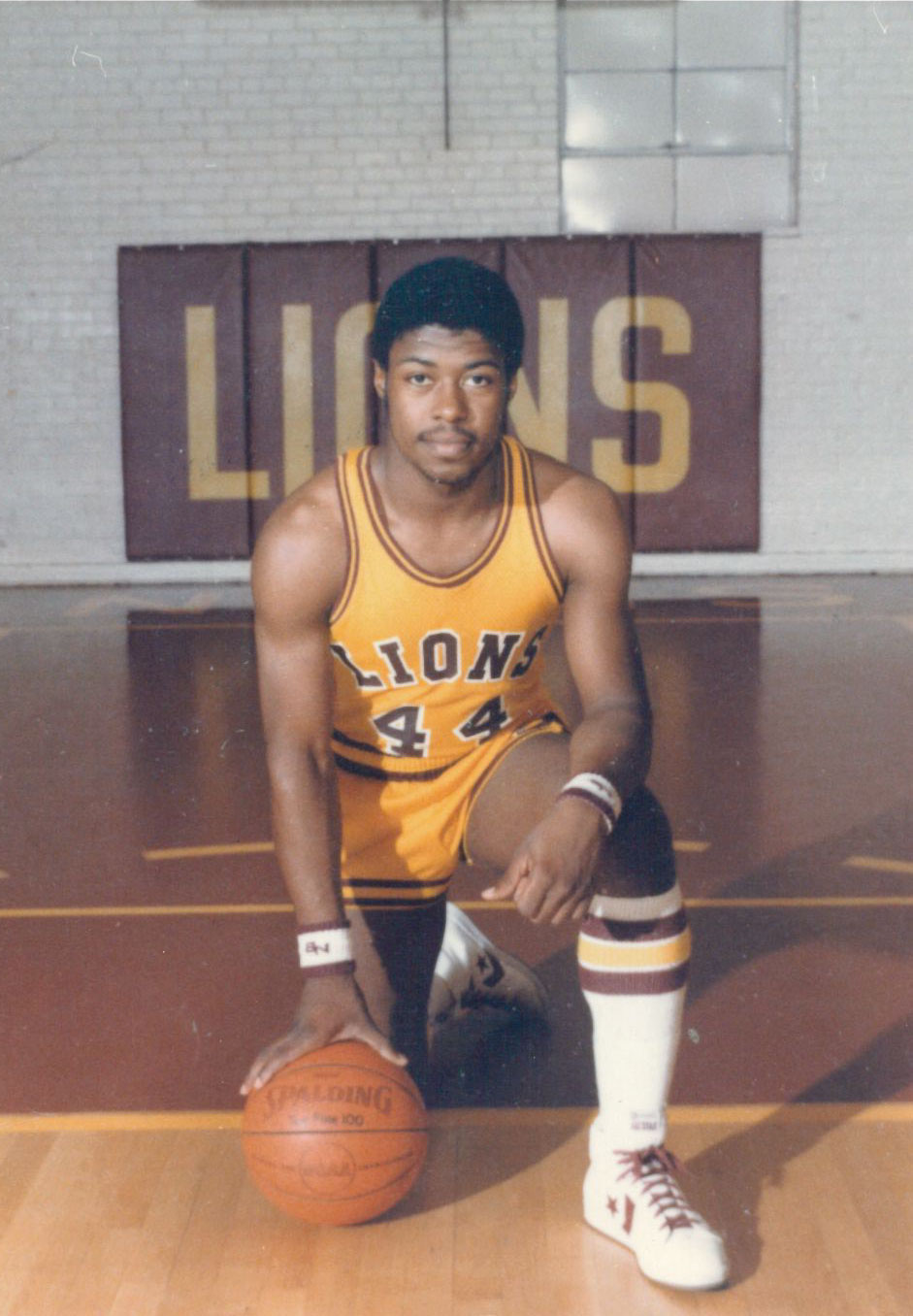
It was going to mean more school. On Oct. 14, 1994, Jones walked through the gray double doors of the police department for the first time as an OSU police officer.
Jones decided if he was going to take the job, he was going to be all in, even if it meant returning to a classroom. After finishing the police academy, he immediately started taking college courses, earning an associate degree, a bachelor’s and then a master’s degree in criminal justice.
Changing Stereotypes
Jones learned quickly that the uniform brought with it a measure of authority and prestige, but also dissension.
“I caught a lot of crap for the first couple of years amongst Black students,” he said. “They didn’t like it. They felt like I couldn’t be trusted or I was a traitor.”
He joined the OSUPD a little more than three years after the 1991 Rodney King incident where a Black man was a victim of police brutality in Los Angeles after a high-speed pursuit for driving while intoxicated. Right before Christmas, Jones was in plain clothes, speaking to an African American fraternity on campus. When he was introduced as an OSU police officer, the tension became palpable. A Black student came up to him and asked, “Why y’all beat up Rodney King?”
It was another turning point in Jones’ career. This was the time to inspire change.
“I said, ‘Man, I’m here to do a job. I’m here to try to protect this campus, and you’re part of it as well. Don’t be like that,’” he said. “‘Let your guard down and see. We might get along. Who knows?’”
An opportunity to bridge the gap between students and police officers arrived when Jones was offered the opportunity to start the bike patrol program. Everyone else who had been offered the chance to start the program declined. Some simply didn’t want to wear the uniform shorts. Jones didn’t mind.
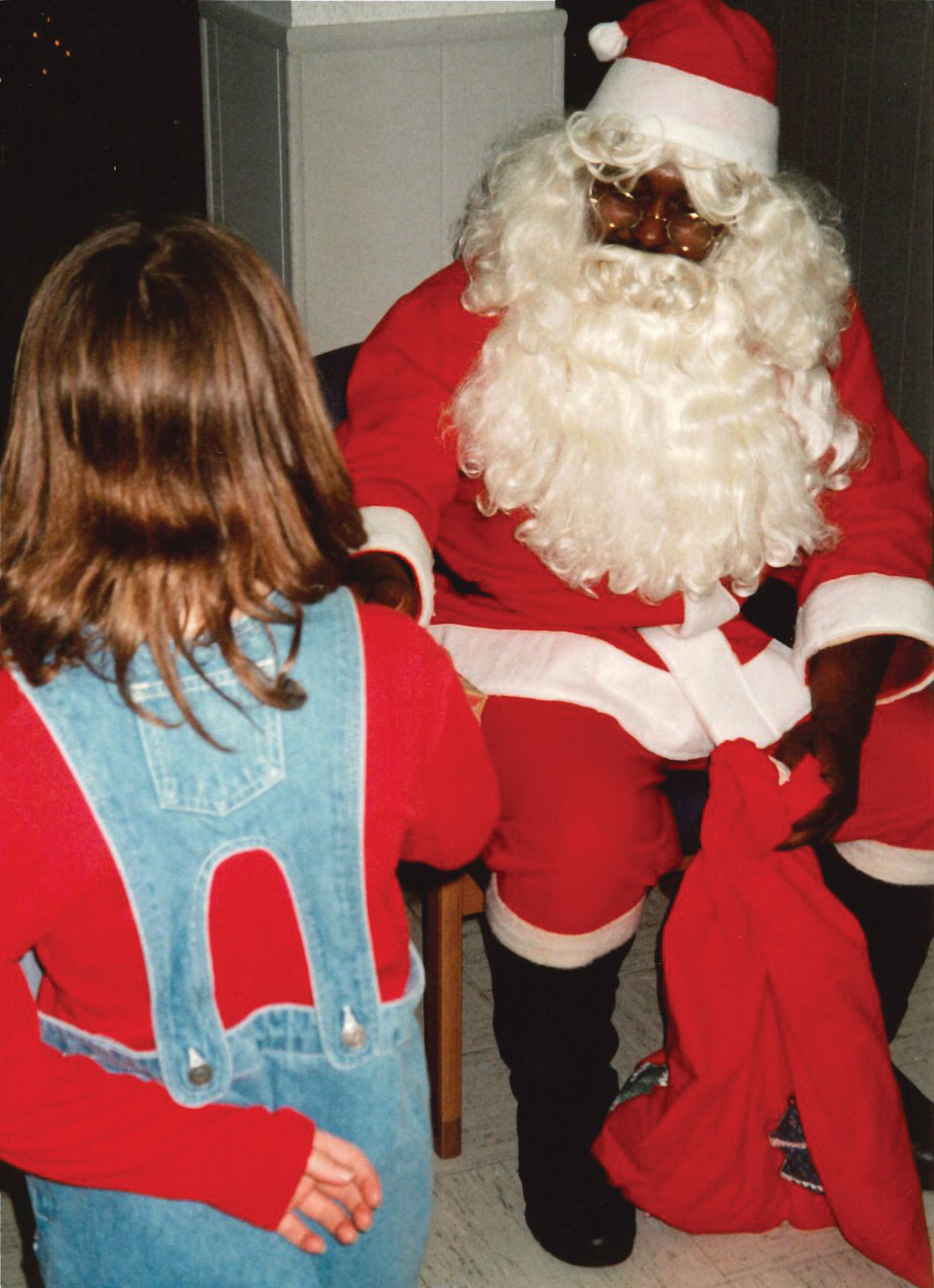
“It got me out of a patrol car and while I’m riding around campus, I can visit more people,” he said. “I can talk to more people. I still do my job as a law enforcement officer, but I’m more visible and accessible. It removes the mindset that I’m only going to talk to people who are breaking the law. Now, I’m going to talk to people just walking down the street. Then I can educate people about bicycle safety, pedestrian safety — just about the law.
“I started learning that most people will do what you ask if they know what it is you want them to do, and people break the law most of the time because they don’t know what it is.”
Afterward, Jones was asked to start the first community policing program on campus. He was given an office in Willham Hall to man several hours a day. He took existing programs like bicycle registration and Operation ID — where students wrote down serial numbers to their important possessions — and set up tables in residence halls and the library to make it more convenient for students to take part.
It was an opportunity to help the campus community have a hand in protecting themselves as well.
“I like to see the opportunity no one else wants to take. People would ask, ‘Why did you get chosen for this?’ I would tell them, ‘Because when I was asked, I didn’t turn it down,’” he said.
Since becoming chief, he’s started the Core Campus Patrol Division, which puts officers on foot and bicycles in the most populated area of campus during peak hours — locations hard to access by car like the Student Union and Edmon Low Library. The department also has implemented the liaison program, which pairs officers with athletic teams and student groups.
Jones hasn’t looked for moments of glory. He has served, to the best of his ability, even in the toughest of days including at the site of the 2001 OSU men’s basketball plane crash in Colorado. He said it took two years to process that experience.
“People take this job thinking they’re supposed to be a hero,” he said. “That within itself is selfish. Real heroes don’t think about themselves; they’re thinking about the people.”
OSU Athletic Director Chad Weiberg, who lost his brother, Jared, in the crash, has witnessed Jones’ heart and philosophy firsthand.
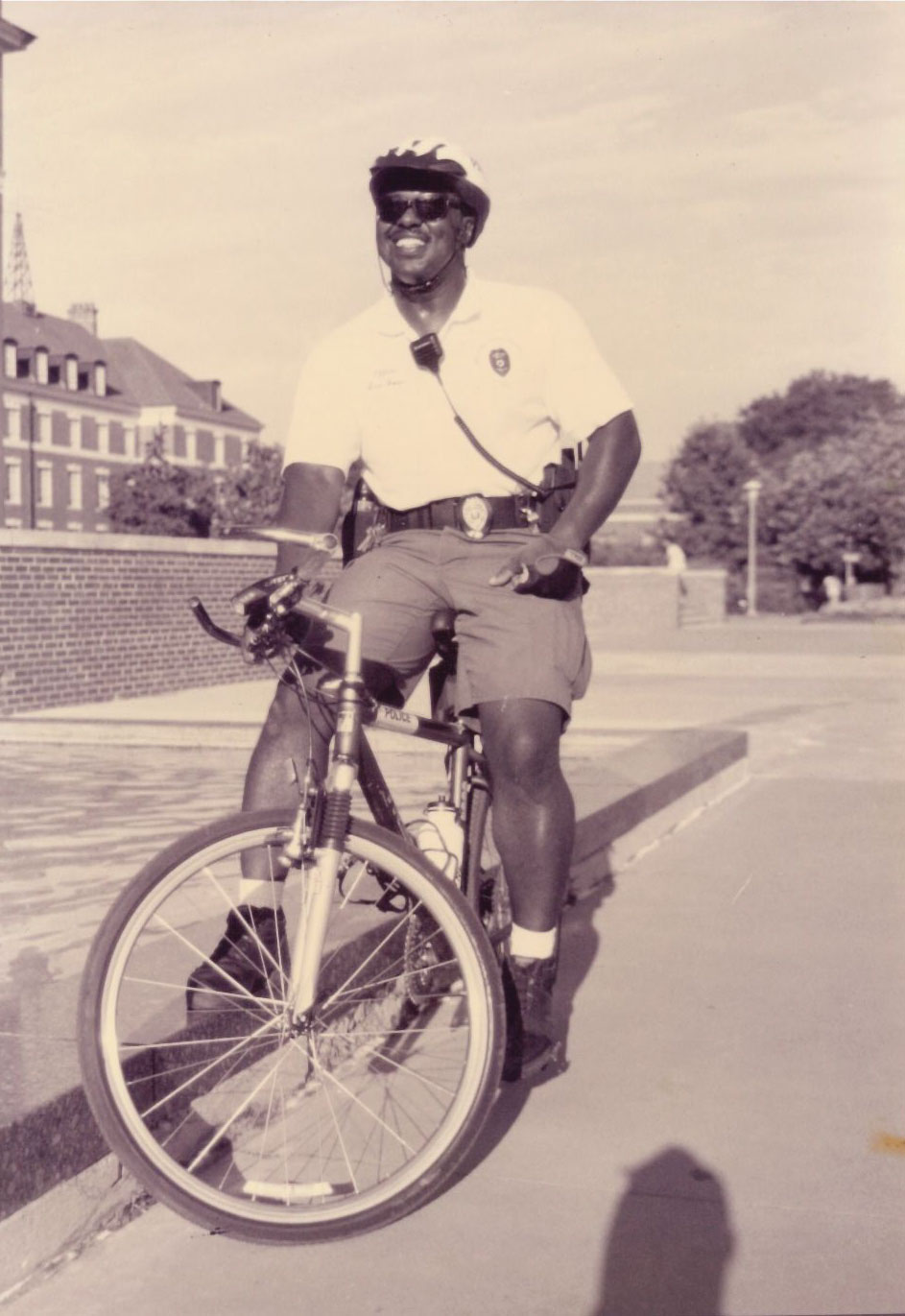
“The thing about Leon is that it’s never about him. It’s about the people of OSU and what he can do to help them,” Weiberg said. “For me, it goes back to the time of the plane crash. Leon was there for all of us and made sure we knew that he would always be there for us. After I left OSU and would come back to games, Leon was always there with that big smile, waiting to say hello and give me a big ‘welcome home’ hug. I don’t think he knows how much that meant to me every time.
“Since I’ve been back, Leon has continued to be there to help me, our coaches and our student-athletes in every way that he can. I was so happy for him when he became Chief Jones. He earned it and deserved it. We’re fortunate to have him at OSU, and I’m blessed to be able to call him a friend.”
Appreciating the Opportunity
The color of those double doors hasn’t changed, but Jones’ hair has started to match it. The kid from New Boston who couldn’t stand school has spent half his life on a college campus.
“Every day I walk through those doors, it’s a new day. It’s a new adventure. Some days I walk in knowing I’m the police chief at the OSU Police Department and I get a little overwhelmed,” he said. “I actually did this. I’m actually the chief. I love my job and what I get to do. It’s a privilege.”
Jones is quick to credit all those who helped him along the way, as well as the institution that gave him his start and now calls him “chief.”
“Oklahoma State has invested as much in me as I have in the Cowboy family. Everything about Oklahoma State University, I feel like I was born for,” he said. “I didn’t know who I was until I got here.”
Photos by: Phil Shockley and courtesy of Leon Jones
Story by: Shannon Rigsby | STATE Magazine
